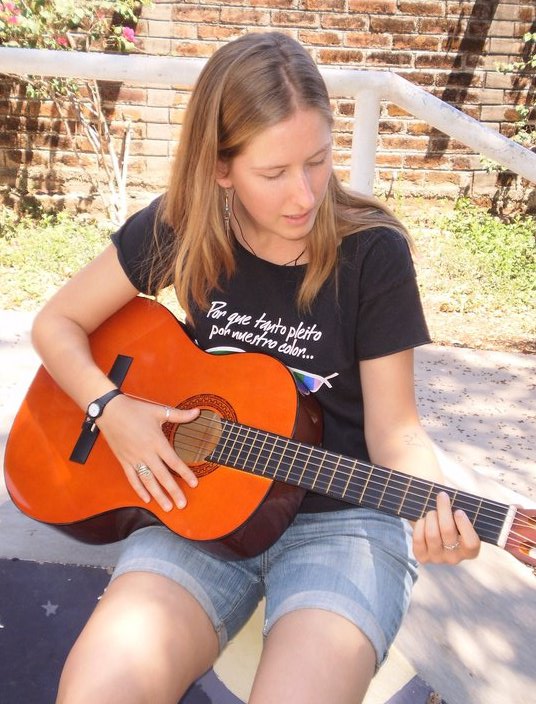On Friday night, several of us from the Center went to El Sitio to take part in and document (for the museum) their community vigil for Copapayo. Effectively all of the families in the community come originally from Copapayo and the sole survivor of the massacre lives there. There is a sister parish in Michigan that always sends a delegation this time of year to celebrate the commemoration together, which is why the vigil was this weekend. We ate in the house of one of my students then went back to the gazebo/plaza and saw a couple short videos before folks gathered for the procession. Then we all worshiped together in a mass said by the priest from St. Catherine's (this MI parish). After the mass, which was wonderful in so many ways, we went back out in front of the church for music (provided by a group from the neighboring community of El Barío, including Alex's Davíd and Nico, with whom we work in the museum). After the music, the youth of El Sitio - about 90% of them students in 7th-9th grade at the school - got up on the gazebo platform and read the names of the people who were killed in the massacre. After every name, we repeated está presente, "is present" (here/with us). This is a most powerful way recognizing the life and continued presence of people who were killed. And we said it 155 times, including once for an infant of 8 days. It was a gift and an honor to be there sharing the evening with the students and the community that has so opened its arms to me and Christy in our time here.
The gift from yesterday actually starts a couple weeks ago on Margaret Jane's birthday. We (Ariel, Christy, Rosa, Eva, and I) had just gotten back from the actual community of Copapayo on Sunday morning after the vigil the night before and a friend of Margarita's came over for breakfast to celebrate her birthday. The three of us breakfasted together as Margaret Jane and Lita (who is a health promoter in her community) shared stories of their friendship during the war and a trip they took to Geneva to present a paper on health issues among refugee women in El Salvador (of which Lita was then-currently one). This in and of itself was a gift.
During the meal, Lita told me about a book about the experiences of displaced and repatriated communities during and after the war. She told me she would bring it to me and I was really excited, but it sort of fell out of my mind. Well, yesterday, while Ariel and I were doing a lunchtime loop that included food, the ATM, and buying baby shower things for our friends Marvin and Karla, we ran into Lita who was in town for the HUGE confirmation Sunday. (Jay, if you're reading this: 270 confirmands. I think HTLC's new confirmation strategy should include something along the lines of "be Catholic." Just a thought.)
When we saw each other, Lita reached into her bag and pulled out a bound photocopy of the book she had been describing during breakfast. When I told her that I was so thrilled to read it and would get it back to her asap via Susan or Margarita, her response was, "no, no, no - te lo regalo" (basically, "no way, I'm giving it to you"). She made and bound the copy of this book for me after one breakfast conversation and brought it with her since she knew she was coming to town and could give/leave it for me. I almost wept.
 Then, back at the museum, I got to looking at the book. It has testimonies, songs, poems, drawings, chronologies, maps - all from people who lived either in refugee camps in Honduras or Nicaragua or in internally displaced camps within El Salvador, such as Calle Real (where Margaret Jane worked for five years in the 80s - and where she and Lita met). Vilma, the other person working the museum for the day, recognized the book and we looked through it together. As it turns out, she was born in Mesa Grande, one of the camps in Honduras, and lived there until she was 6 years old. She knew the tunes of several of the songs and sang them for me, right there in the entrance to the museum.
Then, back at the museum, I got to looking at the book. It has testimonies, songs, poems, drawings, chronologies, maps - all from people who lived either in refugee camps in Honduras or Nicaragua or in internally displaced camps within El Salvador, such as Calle Real (where Margaret Jane worked for five years in the 80s - and where she and Lita met). Vilma, the other person working the museum for the day, recognized the book and we looked through it together. As it turns out, she was born in Mesa Grande, one of the camps in Honduras, and lived there until she was 6 years old. She knew the tunes of several of the songs and sang them for me, right there in the entrance to the museum.I...don't know what to do with all of this. I mean, I know of course that we're going to make another copy of the book for the museum and probably a couple more for the other volunteers. The practical, obvious steps. But what I'm actually going to DO with this embodied, copied, bound love that I received yesterday? That is still developing.
Meanwhile, we have grand plans for a Thanksgiving feast this Thursday and I will have no problem thinking of things I'm thankful for.
